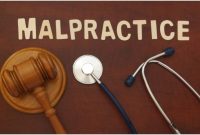When medical malpractice occurs, the consequences can be devastating. Patients may suffer serious injuries or even death, and their families may be left with overwhelming medical bills and emotional distress. In these cases, it is essential to gather evidence to prove the negligence of the medical professional or institution.
Evidence is the foundation of any medical malpractice lawsuit. It can help to establish liability, prove damages, and support the plaintiff’s claims. Without strong evidence, it is difficult to win a medical malpractice case.
Introduction
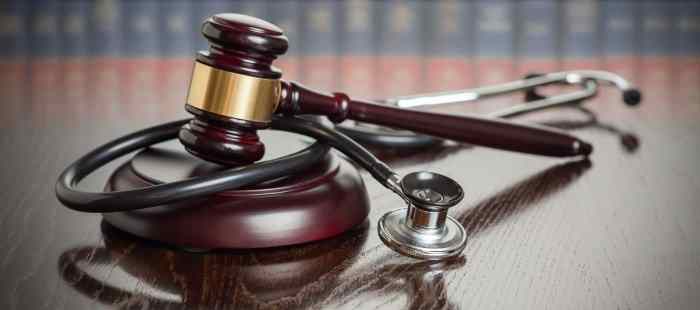
Medical malpractice refers to any act or omission by a healthcare professional that deviates from the accepted standards of care and results in harm to the patient. Establishing liability in medical malpractice lawsuits hinges on the ability to gather and present compelling evidence that supports the plaintiff’s claims.
Evidence plays a pivotal role in demonstrating the following elements:
- Duty of care: Establishing that the healthcare professional owed a duty of care to the patient.
- Breach of duty: Proving that the healthcare professional’s actions or omissions fell short of the accepted standards of care.
- Causation: Demonstrating that the breach of duty directly caused the patient’s injuries.
- Damages: Quantifying the harm suffered by the patient as a result of the medical malpractice.
Types of Evidence
Evidence in medical malpractice lawsuits can take various forms, including:
- Medical records: These document the patient’s medical history, diagnosis, treatment, and prognosis.
- Expert testimony: Medical experts provide opinions on the standard of care, causation, and the extent of the patient’s injuries.
- Witness testimony: Statements from nurses, other healthcare professionals, or family members can corroborate the patient’s account of events.
- Physical evidence: This includes medical devices, implants, or other tangible objects that may have contributed to the patient’s injuries.
Types of Evidence in Medical Malpractice Lawsuits

Medical malpractice lawsuits rely on various types of evidence to establish liability and damages. These include medical records, expert witness testimony, and physical evidence such as medical devices or implants.
Medical Records
Medical records are crucial in medical malpractice cases. They provide a detailed account of the patient’s medical history, diagnosis, treatment, and prognosis. These records can help establish the standard of care, identify deviations from that standard, and assess the extent of the patient’s injuries.
Expert Witness Testimony
Expert witnesses play a significant role in medical malpractice cases. These experts, who are typically medical professionals, provide opinions on the standard of care, the defendant’s actions, and the causation of the patient’s injuries. Their testimony can help the jury understand complex medical issues and assess the merits of the case.
Physical Evidence
Physical evidence, such as medical devices or implants, can provide tangible proof of negligence or wrongdoing. These items can be examined by experts to determine if they were defective or improperly used, contributing to the patient’s injuries.
Gathering and Preserving Evidence
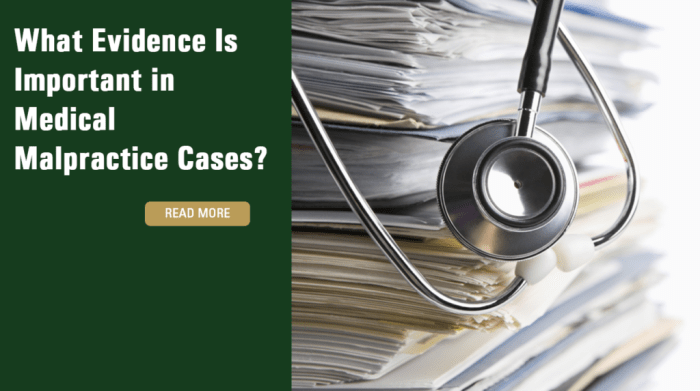
Gathering and preserving evidence is crucial in medical malpractice lawsuits. By securing strong evidence, you can build a solid case and increase your chances of success.
Here are some key steps to follow:
Medical Records
- Obtain copies of all medical records related to the case, including hospital charts, doctor’s notes, and lab results.
- Review the records carefully to identify any discrepancies or inconsistencies that may support your claim.
Expert Witness Testimony
- Identify and retain qualified expert witnesses who can provide testimony on the relevant medical issues in the case.
- Work closely with the experts to prepare them for trial and ensure their testimony is clear and persuasive.
Physical Evidence
- Preserve any physical evidence that may support your claim, such as photographs or videos of the injuries, damaged medical equipment, or the scene of the incident.
- Document the chain of custody of the evidence to ensure its authenticity and integrity.
4. Admissibility of Evidence in Medical Malpractice Lawsuits
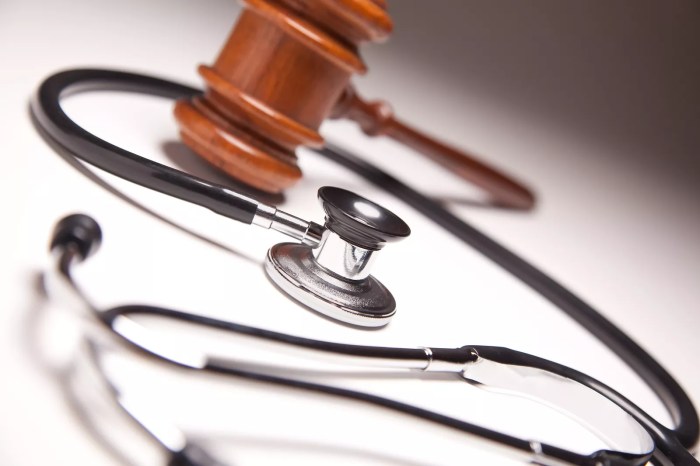
In medical malpractice lawsuits, the admissibility of evidence is crucial for determining the outcome of the case. The legal standards for admitting evidence in court are based on the Federal Rules of Evidence and vary from state to state.Expert witnesses play a vital role in establishing the admissibility of evidence.
They provide specialized knowledge and opinions to help the jury understand complex medical issues and determine whether the evidence is relevant and reliable.
Types of Evidence That May Be Excluded
-
-*Hearsay
Statements made outside of court by a person who is not available to testify.
-*Character evidence
Evidence of a person’s character or reputation, unless it is relevant to the case.
-*Privileged communications
Communications between a patient and their healthcare provider that are protected by law.
Types of Evidence That May Be Admitted
-
-*Medical records
Records of the patient’s medical history, treatment, and diagnosis.
-*Expert testimony
Opinions of qualified experts on medical standards of care and the cause of the patient’s injuries.
-*Physical evidence
Objects or items that are relevant to the case, such as medical devices or surgical instruments.
Challenges in Gathering Evidence
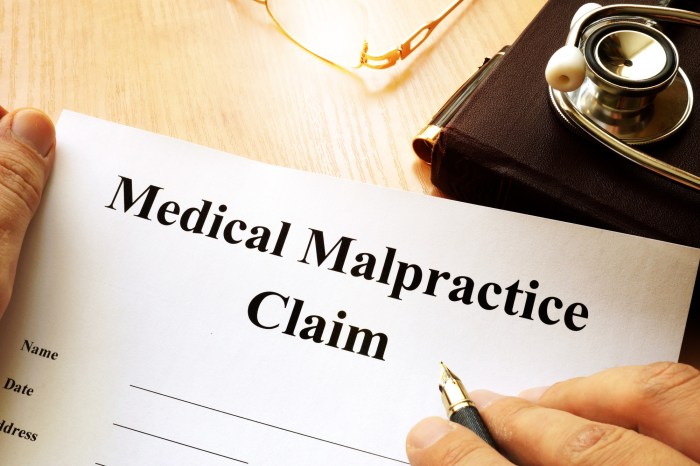
Gathering evidence in medical malpractice lawsuits can be challenging due to several obstacles.
Obtaining Medical Records
One common obstacle is obtaining medical records. Healthcare providers may be reluctant to release patient records due to privacy concerns or fear of litigation. Additionally, records may be incomplete, inaccurate, or lost.
Finding and Retaining Expert Witnesses
Another challenge is finding and retaining qualified expert witnesses. Medical malpractice cases often require expert testimony to establish the standard of care and prove negligence. However, finding experts with the necessary knowledge and experience can be difficult, and they may be reluctant to testify due to potential liability.
Preserving Physical Evidence
Preserving physical evidence is also crucial in medical malpractice lawsuits. This may include medical devices, implants, or tissue samples. However, preserving physical evidence can be challenging due to legal and ethical considerations, such as patient privacy and the chain of custody.
Impact of Evidence on Medical Malpractice Cases
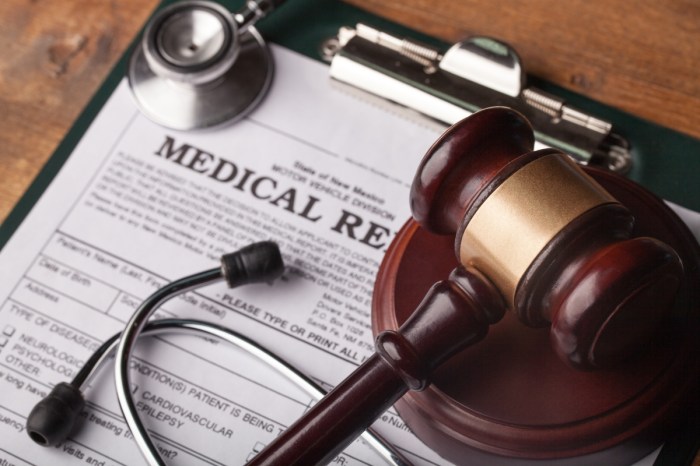
Evidence plays a pivotal role in medical malpractice lawsuits, significantly influencing the outcome of the case. Strong evidence can bolster a claim for liability, while weak evidence can undermine it.
Impact of Strong Evidence
Robust evidence, such as medical records, expert witness testimony, and eyewitness accounts, can strengthen a case for liability by:
- Establishing the existence of a doctor-patient relationship
- Proving the breach of the standard of care
- Linking the breach of care to the plaintiff’s injuries
Impact of Weak Evidence
Insufficient or unreliable evidence can weaken a case for liability by:
- Failing to establish a clear connection between the doctor’s actions and the plaintiff’s injuries
- Creating reasonable doubt about the breach of the standard of care
- Allowing the defense to cast doubt on the plaintiff’s credibility or motives
Case Studies
Case 1: In a case where a patient suffered a severe infection after surgery, strong medical records and expert testimony proved that the surgeon had failed to follow proper sterilization procedures, leading to a successful liability verdict.
Case 2: In contrast, in a case where a patient claimed to have suffered nerve damage during surgery, weak evidence and conflicting expert opinions resulted in the dismissal of the lawsuit.
Conclusion
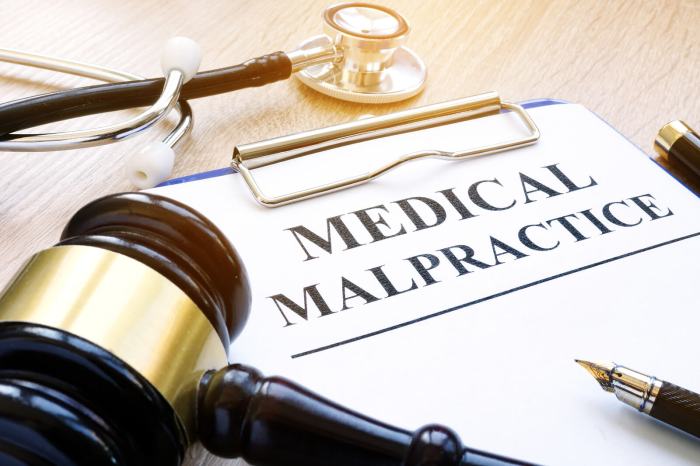
Gathering evidence in medical malpractice lawsuits can be a complex and challenging process, but it is essential to the success of the case. By following the steps Artikeld above, you can help to ensure that you have the evidence you need to prove your case and obtain the justice you deserve.
Answers to Common Questions
What are some common types of evidence in medical malpractice lawsuits?
Some common types of evidence in medical malpractice lawsuits include medical records, expert witness testimony, and physical evidence such as medical devices or implants.
How can I gather medical records for a medical malpractice lawsuit?
To gather medical records for a medical malpractice lawsuit, you can start by requesting them from the medical provider. You may also need to obtain a subpoena or court order to compel the release of the records.
What are the challenges in gathering evidence in medical malpractice lawsuits?
Some of the challenges in gathering evidence in medical malpractice lawsuits include obtaining medical records, finding and retaining qualified expert witnesses, and preserving physical evidence.



